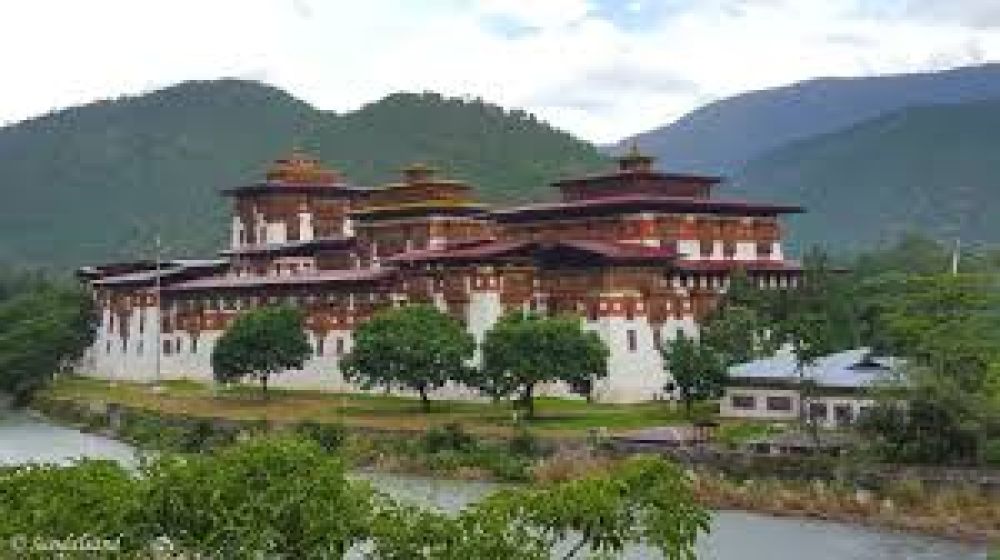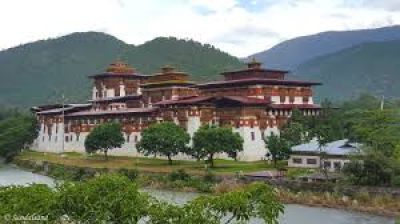

The splendid Punakha Dzong, also known as 'The Palace of Great Happiness', is located at the confluence of the Pho Chhu and Mo Chhu rivers. It is one of Bhutan's most majestic structures, and serves as a timeless testament to the architectural grandeur of Bhutanese culture. As the second oldest and second-largest dzong in Bhutan, it was originally constructed in the 17th century by Zhabdrung Ngawang Namgyal and has since held significant importance in the country's history. Visitors are treated to an impressive array of intricate woodwork and beautiful religious art. Inside the dzong, you can find many sacred artifacts and relics that pertain to the Bhutanese Buddhist tradition. The dzong also comes alive with vibrant colors and festivities during the annual Punakha Tshechu, a religious festival that draws crowds from far and wide. Exploring Punakha Dzong provides an excellent glimpse into the historical and spiritual fabric of Bhutan.
For adventure enthusiasts, river rafting on the Pho Chhu River offers an exhilarating opportunity to enjoy the scenic beauty and thrilling rapids of Punakha. The stretch along the Pho Chhu includes a mix of calm waters and class II to IV rapids, making it a suitable rafting experience for both novices and experienced rafters. On this journey, rafters are treated to views of the beautiful Punakha Dzong, lush terraced fields, and local villages. Safety is a top priority, with experienced guides and proper gear provided. It’s not just about the adrenaline rush; the tranquillity of the surrounding hills and the clear, azure waters make the experience highly captivating. This adventure also offers a unique vantage point from which to enjoy Bhutan’s pristine environment and connect with nature in a way that is both memorable and exciting.
The hike to Khamsum Yulley Namgyal Chorten is a pleasurable experience that immerses travelers in the peaceful and scenic natural landscape of Bhutan. The chorten stands majestically on a ridge with a panoramic view of the valley below and was built to promote peace, stability, and harmony in an ever-changing world. It is a four-storey temple with elaborate paintings and statures that reflect the religious traditions of Bhutan. The hike typically begins with a crossing over the suspension bridge over the Mo Chhu River, followed by a gentle ascent through paddy fields and pine forests. It takes approximately 45 minutes to one hour to reach the site, where visitors can not only explore the chorten but also enjoy stunning views of the valley, making it a rewarding experience for hikers and cultural enthusiasts alike.
Sangchhen Dorji Lhuendrup Lhakhang Nunnery is a serene retreat perched on a commanding hilltop, providing panoramic views of the plush valleys below. This nunnery is not just a sanctuary for spiritual seekers but also serves as a religious school for Bhutanese nuns where they receive training in life skills such as tailoring, embroidery, statue making, and thangka painting, alongside traditional Buddhist education. The structure of the nunnery is particularly noteworthy, flaunting a contemporary style melded with traditional Bhutanese architectural elements. The temple houses a 14-foot high bronze statue of Avalokiteshvara, and the walls are adorned with intricate paintings depicting various aspects of Buddhist lore. Visiting the nunnery is a tranquil experience, enveloping guests in a sense of peace and spirituality that is so deeply ingrained in Bhutanese culture.
Bhutan as a land of medicinal hot springs, known locally as Tshachus, offers a unique experience for those looking to relax and rejuvenate. Gasa Tshachus is one such therapeutic hot spring situated close to Punakha, attracting both locals and tourists seeking the healing properties of its mineral-rich waters. Nestled in the picturesque valley of the Mo Chhu River, adjacent to the Gasa Dzong, this hot spring has several pools with varying temperatures where one can soak and unwind amidst nature. According to Bhutanese traditional medicine, the hot springs are believed to cure ailments such as arthritis, skin infections, and even digestive problems. The road to Gasa Tshachus takes you through breathtaking landscapes of terraced hills and dense forests. A visit to these healing hot springs offers a holistic experience combining elements of wellness, spirituality, and the untouched beauty of Bhutan's wilderness.
Chimi Lhakhang, fondly known as the 'Temple of Fertility', sits atop a small hill in the Punakha region. It is a modest monastery that holds an unusual legacy. Founded in the 15th century by the 'Divine Madman' or Drukpa Kunley, a saint known for his unconventional approach to Buddhism, it is a shrine dedicated to fertility. Couples from all over the world flock to this temple with the hope of being blessed with children. The walk to Chimi Lhakhang passes through the village of Sopsokha, where houses are adorned with phallic paintings, and then cuts across paddy fields offering vistas of the serene countryside. Exploring Chimi Lhakhang involves a short but beautiful hike and provides an insight into the unique cultural practices of Bhutan. The temple’s rich history and the heartfelt stories of those who have been blessed here, make it an unforgettable destination for visitors.
Limbhukha, known for its peace-loving inhabitants and its unique annual festival of serenity, the 'Serda', is a quaint village located a few hours’ hike from Punakha. Surrounded by verdant fields of rice and dotted with traditional homes, this village offers a glimpse into the rural and pastoral life of Bhutan. The trek to Limbhukha promises scenic views, lush forests, and an up-close experience with Bhutan's rich flora and fauna. During the Serda festival, locals dress in white to symbolize peace and carry no swords in stark contrast to the other war-themed festivals across Bhutan. Trekking to Limbhukha is not only a physical journey but a journey into the heart of Bhutan's culture and traditions, providing trekkers an opportunity to disconnect from the modern world and engage with nature and simplicity in its purest form.
For those seeking a rush of adrenaline, mountain biking through the Punakha Valley presents an unparalleled opportunity to experience the rugged terrain and stunning landscapes of Bhutan. The valley's varied trails cater to both novices and seasoned bikers, offering a mixture of challenges from gentle riverside tracks to steep mountain roads. Riders can enjoy the marvelous sights of terraced rice paddies, traditional farmhouses, glimmering rivers, and majestic dzongs. Biking in this region affords a closer look at the day-to-day life in rural Bhutanese communities, where you can see farmers at work in their fields or children at play. Along the way, there are plenty of places to rest and soak in the peaceful environment. Renting a bike and taking a guided tour ensures that all technical aspects are handled, allowing bikers to immerse themselves fully in the experience.
Birdwatching enthusiasts will find Punakha's vicinity to Jigme Dorji National Park a privilege, as it is one of Bhutan's biodiversity hotspots. The park, named after the late Jigme Dorji Wangchuck, shelters a wide range of habitats from alpine meadows to subtropical forests. It is home to an astonishing array of bird species, including the endangered White-bellied Heron and the iconic Black-necked Crane. Visitors can embark on guided birdwatching tours to spot various high-altitude species and to learn about Bhutan’s conservation efforts. The tranquil environment and pristine forests provide a perfect backdrop for observing these avian wonders in their natural habitat. With the assistance of a knowledgeable guide, birdwatchers can potentially spot and identify a myriad of species, making the experience both educational and enjoyable.
Archery is Bhutan’s national sport and a cultural cornerstone that reflects the country's heritage. Visitors to Punakha can partake in this popular Bhutanese pastime and gain insight into its significance. Archery competitions are vibrant and lively, usually accompanied by dancing and singing as team members cheer on their mates and jest with their rivals. Trying your hand at archery in Punakha not only allows for learning the basic skills from seasoned archers but also serves as an engaging way to interact with locals and enjoy the convivial atmosphere. The standard distance for targets in traditional Bhutanese archery is about 140 meters, making accurate shooting an impressive feat. Few experiences are as authentically Bhutanese as participating in an archery event while soaking in the breathtaking landscapes of Punakha.
